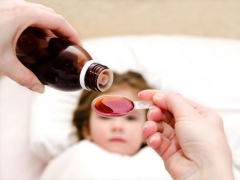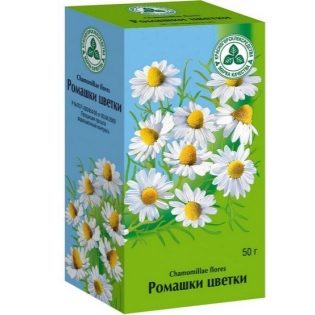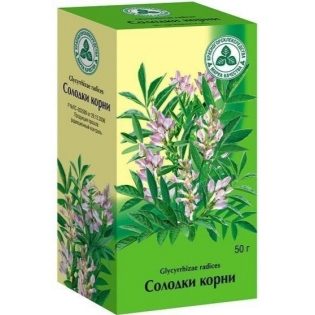Cold preparations for children
Parents believe that the baby is sick if he began to cough. However, cough itself is not a disease; it is only a symptom, a sign that there are certain disorders in the body. Therefore, it is not worth treating it, you need to find and cure its cause. However, to alleviate the condition of the child, special medications are often used to reduce the intensity of cough. We will talk about them today.
Kinds of drugs
Antitussives are effective in cases when you need to cope with unproductive (dry) cough. Especially if he is tormented by a child with frequent attacks, especially at night. It is easy to recognize the agonizing cough - the child cannot cough, and the protective mechanism, which is essentially a cough, does not bring the expected relief.
All cough medicine is divided into two types:
- Preparations of central action. They can be narcotic, more often on the basis of codeine, which are not used in pediatrics, with the exception of severe cases when the disease is treated in a hospital. Children are usually prescribed non-narcotic antitussive drugs of central action, for example, on the basis of butamirate.
- Preparations of peripheral action. They are not narcotic, such drugs are widely used in the treatment of children, they are not addictive, and in their action they are in no way inferior to codeine-containing ones.
Quite often we have to witness situations when parents ask a pharmacist to give "something for cough for a child." Pharmacist gives. Anything. This approach is not allowed.
Antitussive medications can not be picked up on their own or even more in absentia, without seeing the child. After all, there are many reasons that can be caused by coughing: bronchitis, pneumonia, whooping cough, and pharyngitis, as well as allergies, “habitual” cough caused by psychological problems, some diseases of the heart and digestive system, very dry air in the house.
Only a drug that acts on the true causes of a symptom is effective. And it’s up to the doctor to decide what kind of medicine it will be.
The modern pharmacological industry presents a wide choice: the products are available in the form of syrups, drops, inhalation solutions, chewable lozenges, tablets, and sprays for topical use.
Contraindications
Often, the creators of television advertising confuse concepts and mislead people by inviting them to buy “dry and wet cough” products. This is a marketing trick that has nothing to do with the truth. Antitussive remedy is always, in 100% of cases, intended only for therapy with dry cough. Means that help with a wet cough, called mucolytic (expectorant). We will talk about them next time.
It is absolutely impossible to give those and other drugs to the child at the same time. After all, the antitussive drug will inhibit the coughing process itself, and if the baby already has sputum (that is, the wet cough is observed), then this medicine will cause mucus in the bronchi and the position of the child will become completely unenviable. It is fraught with the development of pneumonia and other serious complications.
List of Popular Children's Cough Medicines
For newborns and children up to a year
- "Sinekod" (drops). Quite pleasant to the taste drops in a bottle with a convenient dispenser. Very small children are better to give them in the dosage specified by the doctor. "Sinekod" should not be given to children under the age of 2 months. With great caution, the medicine is prescribed for dry cough and for children under two years of age. This drug is recommended for coughing caused by various diseases, including whooping cough and pneumonia. Dosage for infants-10 drops of Sinekod 4 times a day.
- Panatus (syrup). This drug is very effective for dry and unproductive cough caused by bronchitis, pharyngitis, whooping cough. The medicine should not be given to children who are not half a year old. Dosage at a time for tots from 6 months-2.5 ml. The multiplicity of reception is 4 times a day.
For children from 1 year to 3 years
- "Sinekod" (drops). This antitussive drug for this age group is also prescribed in the form of drops for internal use. The dosage is determined by the doctor, the average statistical dose for children from 1 year-15 drops four times a day.
- "Stoptussin" (drops). This is a combined medicine, it has shown itself from the best side with a dry irritating cough, which occurs in children with infectious inflammatory processes in the upper and lower respiratory tract. The dosage of the drug prescribed by the doctor, counting it based on the weight of the baby. From 1 year for lightweight babies with a weight of up to 7 kilograms, no more than 8 drops are prescribed at a time three times a day. Children who weigh up to 12 kilograms can be given three or four times a day with 9 drops of the drug. For children up to 20 kilograms, the initial single dose will be 15 drops three times a day.
- Panatus (syrup). This medicine for babies of the specified age is applied in an initial dosage of 5 ml. Reception frequency - no more than four times a day.
- "Glycodin" (syrup). This drug is quite effective for dry cough, which accompanies both acute and chronic respiratory diseases. Syrup should not be given to children under one year old, and babies from 1 to 3 years old must consult a doctor. The doctor prescribes a dosage of syrup individually.
For children from 3 to 5 years
- "Sinekod" (syrup). Grown up kids can be given "Sinekod" in the form of a sweet syrup. It is pleasant, does not cause disgust, it is usually drunk quite easily. The dosage of the drug for children aged 3 years, 4 years, 5 years and a little older - 5 ml of syrup three times a day. If there is a desire or need (diabetes, for example) to give a child at this age a Sinekod in drops, then the initial dose for a three-year-old child is 25 drops four times a day.
- «Omnitus"(Syrup). The drug, which facilitates dry cough with influenza and ARVI, is prescribed only to children who have reached the age of three. Permissible dose in age from 3 to 5 years - 10 ml of syrup three times a day.
- «Codelac Neo». This syrup is considered one of the most effective means of treating dry cough in children who have already turned three years old. It is quite pleasant to the taste. Babies from three to five are prescribed a dose not exceeding 5 ml. You can give the syrup three times a day, if the child refuses to drink it, “Codelac Neo” may well be diluted with a small amount of tea or juice. The course of treatment is five days. If the cough does not go away, this is a good reason to go to the doctor again.
- Panatus (syrup). This medicine is palatable, has a neutral taste. Children of the specified age are prescribed in a dosage of not more than 10 ml at a time. Giving syrup should be 3-4 times a day.
- Alex Plus (lozenges). This cough medicine can be given to children from 4 years. The consequences of taking it at an earlier age are not well understood, and therefore it is better not to risk it. Children from 4 to 6 years old put 1 pastil three times a day.
- «Bronholitin"(Syrup). This medicine not only suppresses dry cough, but also expands the bronchi, which contributes to the speedy recovery. This property of the drug is very helpful in the treatment of bronchitis, tracheobronchitis, pneumonia.For children from 3 years old, syrup can be given 10 ml at a time, three times.
For children from 5 years and older
- "Sinekod" (syrup). The dosage of syrup for such children with a dry cough is from 10 ml. drug 3 times a day, starting from 12 years of age, the dosage should be equal to an adult and start from 15 ml at one time 3-4 times a day (depending on the intensity of cough and doctor's recommendations).
- «Codelac Neo"(Syrup). In the senior preschool and primary school age, this drug is prescribed quite often. It helps with coughing for various reasons, including whooping cough. Dosage for children from 5 to 12 years old - 10 ml of syrup three times a day. A threefold intake is kept as a rule for children over 12 years old, however, for them the dosage increases, and starts from 15 ml.
- «Omnitus"(Syrup). This drug is prescribed to children over five years of age mainly due to dry cough, which appears in a child during the illness of the flu or respiratory viral infections. The initial dose is 15 ml of syrup three times a day. Children older than 10 years, double the dose, it is 30 ml.
- Panatus (tablets). This antitussive drug in solid form is not recommended for children under 6 years old. From the age of six, the medicine is dosed 1 tablet twice a day. After 12 years with a dry and exhausting cough, a teenager is recommended 1 tablet three times a day.
- «Bronholitin"(Syrup). This medicine contains ethanol in its composition, and therefore in no case should it be taken uncontrollably. According to the doctor's prescription, “Bronholitin” is given to children from 5 years old at a dosage of 5 ml three times a day, after 10 years a single dose is doubled, however, the frequency of treatment remains the same - no more than 3 times a day.
- Alex Plus (lozenges). These lozenges for children from 5 years old can be given, provided that the child is not allergic to the components of the medicine. The dosage for this age group is no more than two lozenges at one time. They can be given 3 or 4 times a day, it all depends on the degree of intensity of cough.
Folk remedies
Numerous folk remediesthat are used to treat dry cough in children, are most effective if they are used in the early stages of the disease, until the cough has passed into a prolonged (up to 3 weeks) or chronic (more than 3 months).
The most popular alternative medicine products are licorice, ginger, chest collection, chamomile, sage, thyme.
Aromatic procedures with the use of coniferous oils are useful. At bedtime, children with a dry, hacking cough can be given honey and milk if the baby is not allergic to bee products. Very good soothing night cough and green herbal tea with milk, as well as compresses with vegetable oil (can be olive) and badger fat.
General recommendations
- Antitussives will be most effective if given to a child before meals. It is desirable that the gap between the intake of the drug and food intake was about half an hour.
- When allergic cough requires additional intake of antihistamines, otherwise it will be impossible to cure the baby. As long as the allergic reaction persists, he will continue to cough.
When treating dry cough, be sure to monitor the humidity of the air in the apartment where the child lives, moisten the air with wet towels or with the help of special devices.
During the whole therapy, the child needs plentiful warm drink.
In the following video, the popular pediatric doctor Komarovsky tells in which cases and which antitussives should be given to children.




























